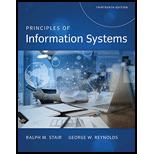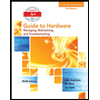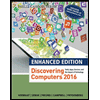
Principles of Information Systems (MindTap Course List)
13th Edition
ISBN: 9781305971776
Author: Ralph Stair, George Reynolds
Publisher: Cengage Learning
expand_more
expand_more
format_list_bulleted
Question
Chapter 3, Problem 10DQ
Program Plan Intro
Components of computer:
Computer has four major components, they are:
- Central processing unit (CPU)
- Memory unit
- Input devices
- Output devices
Central Processing Unit (CPU):
- CPU plays the key role in a computer by carrying out instructions of a computer program.
- It performs all the basic logic, arithmetic, controlling and input/output operations that are specified by the instructions.
- The CPU comprises of two units, Arithmetic logic unit (ALU) and control unit (CU).
Memory unit:
- Once computer program instructions set are transformed into machine code by CPU, the machine code is stored in memory.
- Then the CPU fetches the required data and instructions from memory, perform the required operations and then sends the result and next set of instructions back to memory.
Input devices:
- The devices used by the user to feed information to computer, such as a hard drive, keyboard, or a networking card.
- These devices get the data from outside world into computer in the way that human eyes and ears bring the data to brain.
Output devices:
- Output devices are used by computer to deliver the information to the user, such as a monitor, printer, and speaker.
- The CPU takes the machine code present in memory and converts it into a format that is required by monitor’s hardware.
- Then the monitor’s hardware alters that information into different light intensities such that words or pictures are seen.
Expert Solution & Answer
Trending nowThis is a popular solution!

Students have asked these similar questions
I need help to solve a simple problem using Grover’s algorithm, where the solution is not necessarily known beforehand. The problem is a 2×2 binary sudoku with two rules:
• No column may contain the same value twice.
• No row may contain the same value twice.
Each square in the sudoku is assigned to a variable as follows:
We want to design a quantum circuit that outputs a valid solution to this sudoku. While using Grover’s algorithm for this task is not necessarily practical, the goal is to demonstrate how classical decision problems can be converted into oracles for Grover’s algorithm.
Turning the Problem into a Circuit
To solve this, an oracle needs to be created that helps identify valid solutions. The first step is to construct a classical function within a quantum circuit that checks whether a given state satisfies the sudoku rules.
Since we need to check both columns and rows, there are four conditions to verify:
v0 ≠ v1 # Check top row
v2 ≠ v3 # Check bottom row…
using r language
I need help to solve a simple problem using Grover’s algorithm, where the solution is not necessarily known beforehand. The problem is a 2×2 binary sudoku with two rules:
• No column may contain the same value twice.
• No row may contain the same value twice.
Each square in the sudoku is assigned to a variable as follows:
We want to design a quantum circuit that outputs a valid solution to this sudoku. While using Grover’s algorithm for this task is not necessarily practical, the goal is to demonstrate how classical decision problems can be converted into oracles for Grover’s algorithm.
Turning the Problem into a Circuit
To solve this, an oracle needs to be created that helps identify valid solutions. The first step is to construct a classical function within a quantum circuit that checks whether a given state satisfies the sudoku rules.
Since we need to check both columns and rows, there are four conditions to verify:
v0 ≠ v1 # Check top row
v2 ≠ v3 # Check bottom row…
Chapter 3 Solutions
Principles of Information Systems (MindTap Course List)
Ch. 3.1 - Prob. 1RQCh. 3.1 - Prob. 2RQCh. 3.1 - Prob. 1CTQCh. 3.1 - Prob. 2CTQCh. 3.2 - Prob. 1RQCh. 3.2 - Prob. 2RQCh. 3.2 - Prob. 1CTQCh. 3.2 - Prob. 2CTQCh. 3.3 - Prob. 1RQCh. 3.3 - Prob. 2RQ
Ch. 3.3 - Prob. 1CTQCh. 3.3 - Prob. 2CTQCh. 3 - Prob. 1SATCh. 3 - Prob. 2SATCh. 3 - Prob. 3SATCh. 3 - Prob. 4SATCh. 3 - Prob. 5SATCh. 3 - LI is the fastest type of cache memory built into...Ch. 3 - Prob. 7SATCh. 3 - Prob. 8SATCh. 3 - Prob. 9SATCh. 3 - Prob. 10SATCh. 3 - Prob. 11SATCh. 3 - Prob. 12SATCh. 3 - A _________ is a low-cost, centrally managed...Ch. 3 - Prob. 14SATCh. 3 - Prob. 15SATCh. 3 - Prob. 16SATCh. 3 - Prob. 17SATCh. 3 - Identify four fundamental components of every...Ch. 3 - What is the purpose of the computer bus?Ch. 3 - Prob. 3RQCh. 3 - Prob. 4RQCh. 3 - Prob. 5RQCh. 3 - Prob. 6RQCh. 3 - Prob. 7RQCh. 3 - Prob. 8RQCh. 3 - Prob. 9RQCh. 3 - Prob. 10RQCh. 3 - Prob. 11RQCh. 3 - Prob. 12RQCh. 3 - Prob. 13RQCh. 3 - Prob. 14RQCh. 3 - Prob. 15RQCh. 3 - Prob. 16RQCh. 3 - Prob. 17RQCh. 3 - Prob. 18RQCh. 3 - Prob. 1DQCh. 3 - Prob. 2DQCh. 3 - Prob. 3DQCh. 3 - Prob. 4DQCh. 3 - Prob. 5DQCh. 3 - Prob. 6DQCh. 3 - Prob. 7DQCh. 3 - Prob. 8DQCh. 3 - Prob. 9DQCh. 3 - Prob. 10DQCh. 3 - Prob. 11DQCh. 3 - Prob. 12DQCh. 3 - Prob. 13DQCh. 3 - Prob. 3PSECh. 3 - Prob. 1TACh. 3 - Prob. 2TACh. 3 - Prob. 1WECh. 3 - Prob. 2WECh. 3 - Prob. 3WECh. 3 - Prob. 1CECh. 3 - Prob. 2CECh. 3 - Prob. 3CECh. 3 - Prob. 1CTQ1Ch. 3 - Prob. 2CTQ1Ch. 3 - Prob. 3CTQ1Ch. 3 - Prob. 1CTQ2Ch. 3 - Prob. 2CTQ2Ch. 3 - Prob. 3CTQ2
Knowledge Booster
Similar questions
- using r languagearrow_forwardI need help to solve a simple problem using Grover’s algorithm, where the solution is not necessarily known beforehand. The problem is a 2×2 binary sudoku with two rules: • No column may contain the same value twice. • No row may contain the same value twice. Each square in the sudoku is assigned to a variable as follows: We want to design a quantum circuit that outputs a valid solution to this sudoku. While using Grover’s algorithm for this task is not necessarily practical, the goal is to demonstrate how classical decision problems can be converted into oracles for Grover’s algorithm. Turning the Problem into a Circuit To solve this, an oracle needs to be created that helps identify valid solutions. The first step is to construct a classical function within a quantum circuit that checks whether a given state satisfies the sudoku rules. Since we need to check both columns and rows, there are four conditions to verify: v0 ≠ v1 # Check top row v2 ≠ v3 # Check bottom row…arrow_forward1 Vo V₁ V3 V₂ V₂ 2arrow_forward
- I need help to solve a simple problem using Grover’s algorithm, where the solution is not necessarily known beforehand. The problem is a 2×2 binary sudoku with two rules: • No column may contain the same value twice. • No row may contain the same value twice. Each square in the sudoku is assigned to a variable as follows: We want to design a quantum circuit that outputs a valid solution to this sudoku. While using Grover’s algorithm for this task is not necessarily practical, the goal is to demonstrate how classical decision problems can be converted into oracles for Grover’s algorithm. Turning the Problem into a Circuit To solve this, an oracle needs to be created that helps identify valid solutions. The first step is to construct a classical function within a quantum circuit that checks whether a given state satisfies the sudoku rules. Since we need to check both columns and rows, there are four conditions to verify: v0 ≠ v1 # Check top row v2 ≠ v3 # Check bottom row…arrow_forwardI need help to solve a simple problem using Grover’s algorithm, where the solution is not necessarily known beforehand. The problem is a 2×2 binary sudoku with two rules: • No column may contain the same value twice. • No row may contain the same value twice. Each square in the sudoku is assigned to a variable as follows: We want to design a quantum circuit that outputs a valid solution to this sudoku. While using Grover’s algorithm for this task is not necessarily practical, the goal is to demonstrate how classical decision problems can be converted into oracles for Grover’s algorithm. Turning the Problem into a Circuit To solve this, an oracle needs to be created that helps identify valid solutions. The first step is to construct a classical function within a quantum circuit that checks whether a given state satisfies the sudoku rules. Since we need to check both columns and rows, there are four conditions to verify: v0 ≠ v1 # Check top row v2 ≠ v3 # Check bottom row…arrow_forwardI need help to solve a simple problem using Grover’s algorithm, where the solution is not necessarily known beforehand. The problem is a 2×2 binary sudoku with two rules: • No column may contain the same value twice. • No row may contain the same value twice. Each square in the sudoku is assigned to a variable as follows: We want to design a quantum circuit that outputs a valid solution to this sudoku. While using Grover’s algorithm for this task is not necessarily practical, the goal is to demonstrate how classical decision problems can be converted into oracles for Grover’s algorithm. Turning the Problem into a Circuit To solve this, an oracle needs to be created that helps identify valid solutions. The first step is to construct a classical function within a quantum circuit that checks whether a given state satisfies the sudoku rules. Since we need to check both columns and rows, there are four conditions to verify: v0 ≠ v1 # Check top row v2 ≠ v3 # Check bottom row…arrow_forward
- Don't use ai to answer I will report you answerarrow_forwardYou can use Eclipse later for program verification after submission. 1. Create an abstract Animal class. Then, create a Cat class. Please implement all the methods and inheritance relations in the UML correctly: Animal name: String # Animal (name: String) + getName(): String + setName(name: String): void + toString(): String + makeSound(): void Cat breed : String age: int + Cat(name: String, breed: String, age: int) + getBreed(): String + getAge (): int + toString(): String + makeSound(): void 2. Create a public CatTest class with a main method. In the main method, create one Cat object and print the object using System.out.println(). Then, test makeSound() method. Your printing result must follow the example output: name: Coco, breed: Domestic short-haired, age: 3 Meow Meowarrow_forwardautomata theory can please wright the exact language it know for example say it knows strings start 0 and end with 1 this is as example also as regular expressionarrow_forward
arrow_back_ios
SEE MORE QUESTIONS
arrow_forward_ios
Recommended textbooks for you
 A+ Guide to Hardware (Standalone Book) (MindTap C...Computer ScienceISBN:9781305266452Author:Jean AndrewsPublisher:Cengage Learning
A+ Guide to Hardware (Standalone Book) (MindTap C...Computer ScienceISBN:9781305266452Author:Jean AndrewsPublisher:Cengage Learning A+ Guide To It Technical SupportComputer ScienceISBN:9780357108291Author:ANDREWS, Jean.Publisher:Cengage,
A+ Guide To It Technical SupportComputer ScienceISBN:9780357108291Author:ANDREWS, Jean.Publisher:Cengage, Enhanced Discovering Computers 2017 (Shelly Cashm...Computer ScienceISBN:9781305657458Author:Misty E. Vermaat, Susan L. Sebok, Steven M. Freund, Mark Frydenberg, Jennifer T. CampbellPublisher:Cengage Learning
Enhanced Discovering Computers 2017 (Shelly Cashm...Computer ScienceISBN:9781305657458Author:Misty E. Vermaat, Susan L. Sebok, Steven M. Freund, Mark Frydenberg, Jennifer T. CampbellPublisher:Cengage Learning Fundamentals of Information SystemsComputer ScienceISBN:9781337097536Author:Ralph Stair, George ReynoldsPublisher:Cengage Learning
Fundamentals of Information SystemsComputer ScienceISBN:9781337097536Author:Ralph Stair, George ReynoldsPublisher:Cengage Learning Principles of Information Systems (MindTap Course...Computer ScienceISBN:9781305971776Author:Ralph Stair, George ReynoldsPublisher:Cengage Learning
Principles of Information Systems (MindTap Course...Computer ScienceISBN:9781305971776Author:Ralph Stair, George ReynoldsPublisher:Cengage Learning Systems ArchitectureComputer ScienceISBN:9781305080195Author:Stephen D. BurdPublisher:Cengage Learning
Systems ArchitectureComputer ScienceISBN:9781305080195Author:Stephen D. BurdPublisher:Cengage Learning

A+ Guide to Hardware (Standalone Book) (MindTap C...
Computer Science
ISBN:9781305266452
Author:Jean Andrews
Publisher:Cengage Learning

A+ Guide To It Technical Support
Computer Science
ISBN:9780357108291
Author:ANDREWS, Jean.
Publisher:Cengage,

Enhanced Discovering Computers 2017 (Shelly Cashm...
Computer Science
ISBN:9781305657458
Author:Misty E. Vermaat, Susan L. Sebok, Steven M. Freund, Mark Frydenberg, Jennifer T. Campbell
Publisher:Cengage Learning

Fundamentals of Information Systems
Computer Science
ISBN:9781337097536
Author:Ralph Stair, George Reynolds
Publisher:Cengage Learning

Principles of Information Systems (MindTap Course...
Computer Science
ISBN:9781305971776
Author:Ralph Stair, George Reynolds
Publisher:Cengage Learning

Systems Architecture
Computer Science
ISBN:9781305080195
Author:Stephen D. Burd
Publisher:Cengage Learning